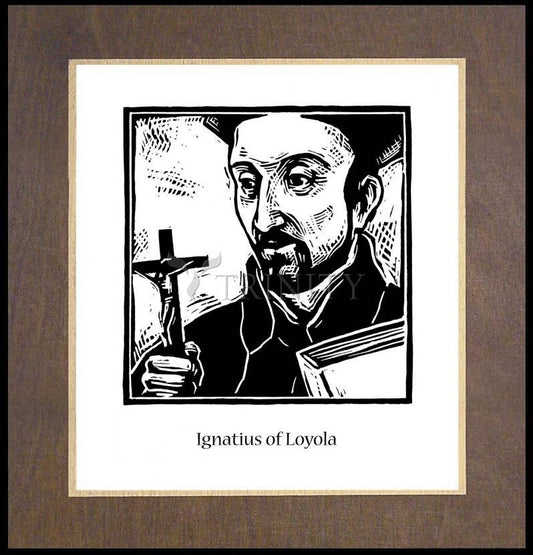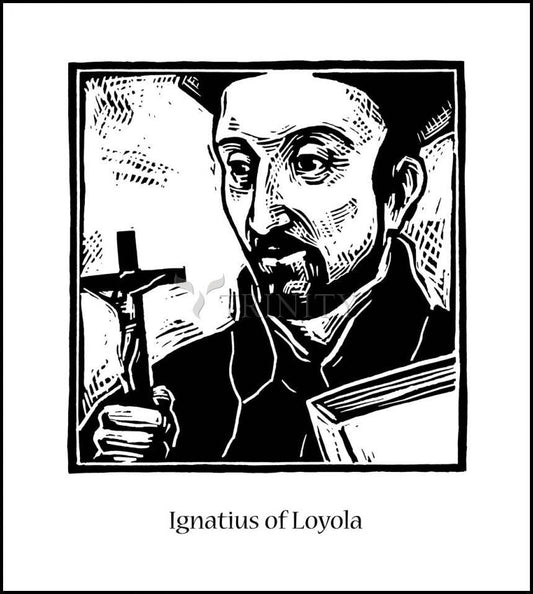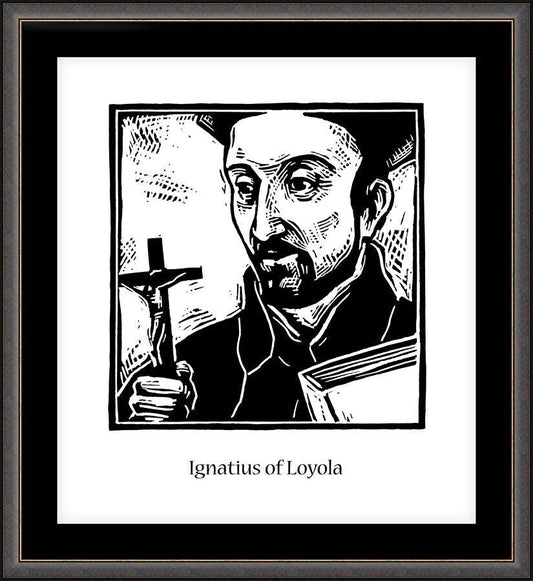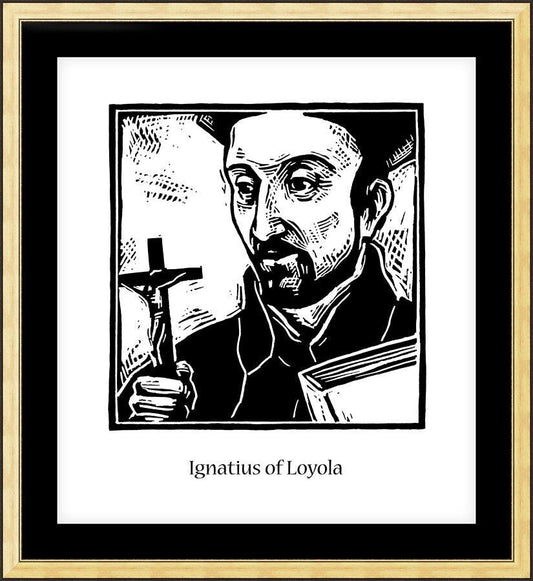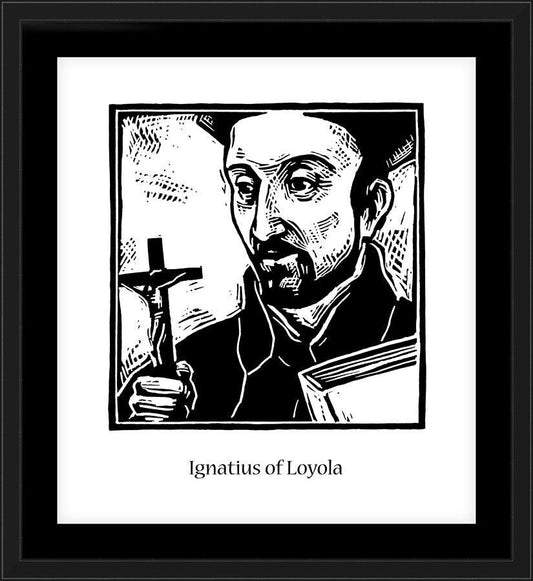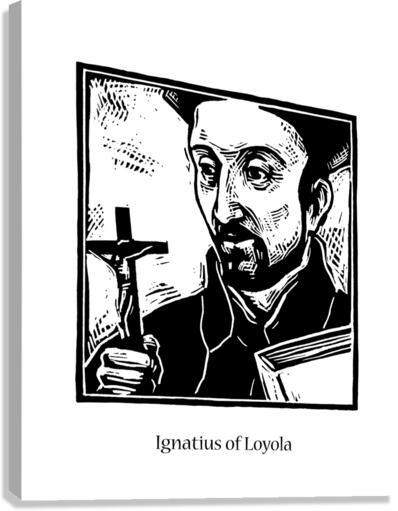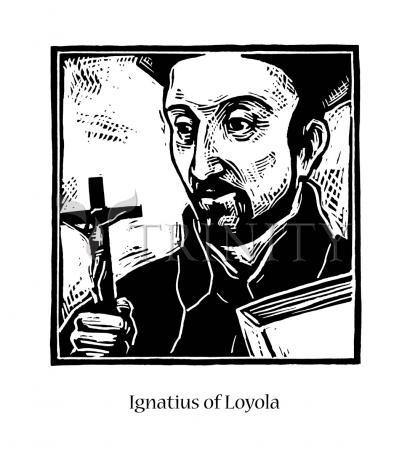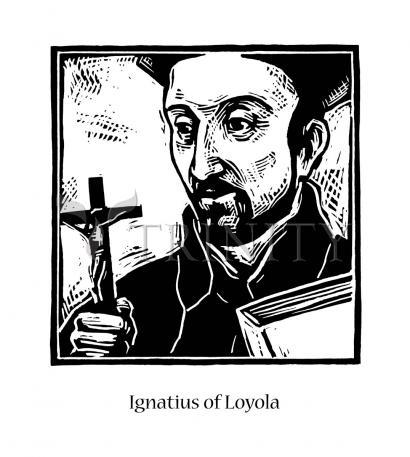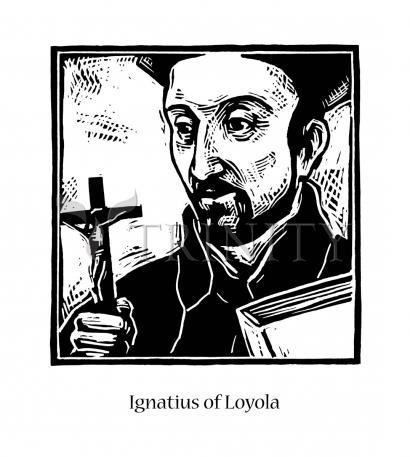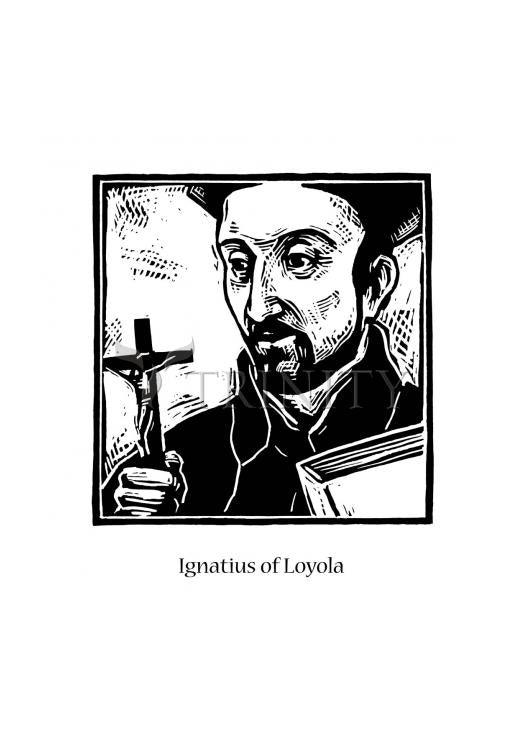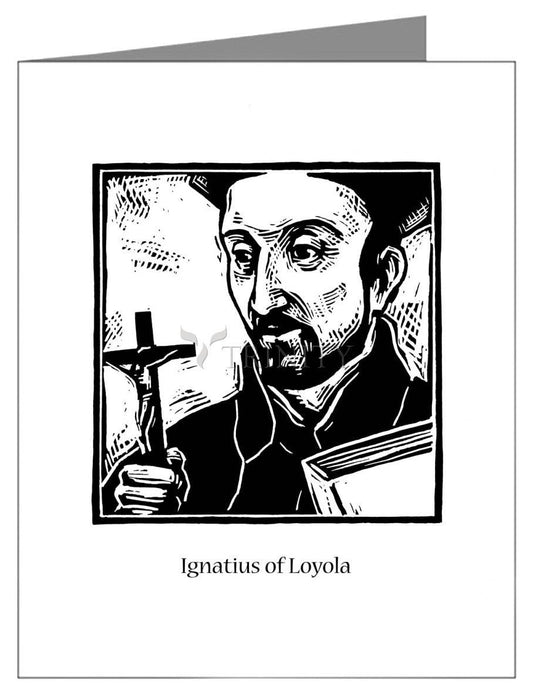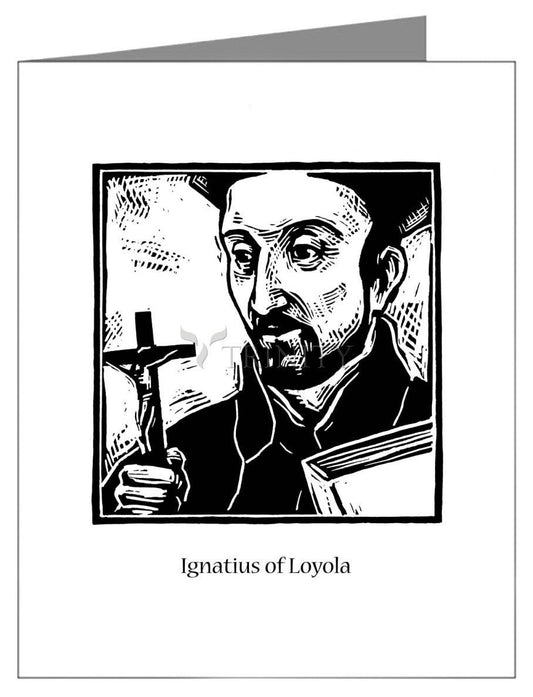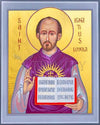Conversion (1491-1521)
At an early age he was made a cleric. We do not know when, or why he was released from clerical obligations. He was brought up in the household of Juan Velásquez de Cuellar, contador mayor to Ferdinand and Isabella, and in his suite probably attended the court from time to time, though not in the royal service. This was perhaps the time of his greatest dissipation and laxity. He was affected and extravagant about his hair and dress, consumed with the desire of winning glory, and would seem to have been sometimes involved in those darker intrigues, for which handsome young courtiers too often think themselves licensed. How far he went on the downward course is still unproved. The balance of evidence tends to show that his own subsequent humble confessions of having been a great sinner should not be treated as pious exaggerations. But we have no details, not even definite charges. In 1517 a change for the better seems to have taken place; Velásquez died and Ignatius took service in the army. The turning-point of his life came in 1521. While the French were besieging the citadel of Pampeluna, a cannon ball, passing between Ignatius' legs, tore open the left calf and broke the right shin (Whit-Tuesday, 20 May, 1521). With his fall the garrison lost heart and surrendered, but he was well treated by the French and carried on a litter to Loyola, where his leg had to be rebroken and reset, and afterwards a protruding end of the bone was sawn off, and the limb, having been shortened by clumsy setting, was stretched out by weights. All these pains were undergone voluntarily, without uttering a cry or submitting to be bound. But the pain and weakness which followed were so great that the patient began to fail and sink. On the eve of Sts. Peter and Paul, however, a turn for the better took place, and he threw off his fever.
So far Ignatius had shown none but the ordinary virtues of the Spanish officer. His dangers and sufferings has doubtless done much to purge his soul, but there was no idea yet of remodeling his life on any higher ideals. Then, in order to divert the weary hours of convalescence, he asked for the romances of chivalry, his favorite reading, but there were none in the castle, and instead they brought him the lives of Christ and of the saints, and he read them in the same quasi-competitive spirit with which he read the achievements of knights and warriors. "Suppose I were to rival this saint in fasting, that one in endurance, that other in pilgrimages." He would then wander off into thoughts of chivalry, and service to fair ladies, especially to one of high rank, whose name is unknown. Then all of a sudden, he became conscious that the after-effect of these dreams was to make him dry and dissatisfied, while the ideas of falling into rank among the saints braced and strengthened him, and left him full of joy and peace. Next it dawned on him that the former ideas were of the world, the latter God-sent; finally, worldly thoughts began to lose their hold, while heavenly ones grew clearer and dearer. One night as he lay awake, pondering these new lights, "he saw clearly", so says his autobiography, "the image of Our Lady with the Holy Child Jesus", at whose sight for a notable time he felt a reassuring sweetness, which eventually left him with such a loathing of his past sins, and especially for those of the flesh, that every unclean imagination seemed blotted out from his soul, and never again was there the least consent to any carnal thought. His conversion was now complete. Everyone noticed that he would speak of nothing but spiritual things, and his elder brother begged him not to take any rash or extreme resolution, which might compromise the honour of their family.
Spiritual formation (1522-24)
When Ignatius left Loyola he had no definite plans for the future, except that he wished to rival all the saints had done in the way of penance. His first care was to make a general confession at the famous sanctuary of Montserrat, where, after three days of self-examination, and carefully noting his sins, he confessed, gave to the poor the rich clothes in which he had come, and put on garment of sack-cloth reaching to his feet. His sword and dagger he suspended at Our Lady's altar, and passed the night watching before them. Next morning, the feast of the Annunciation, 1522, after Communion, he left the sanctuary, not knowing whither he went. But he soon fell in with a kind woman, Iñes Pascual, who showed him a cavern near the neighboring town of Manresa, where he might retire for prayer, austerities, and contemplation, while he lived on alms. But here, instead of obtaining greater peace, he was consumed with the most troublesome scruples. Had he confessed this sin? Had he omitted that circumstance? At one time he was violently tempted to end his miseries by suicide, on which he resolved neither to eat nor to drink (unless his life was in danger), until God granted him the peace which he desired, and so he continued until his confessor stopped him at the end of the week. At last, however, he triumphed over all obstacles, and then abounded in wonderful graces and visions.
It was at this time, too, that he began to make notes of his spiritual experiences, notes which grew into the little book of "The Spiritual Exercises". God also afflicted him with severe sicknesses, when he was looked after by friends in the public hospital; for many felt drawn towards him, and he requited their many kind offices by teaching them how to pray and instructing them in spiritual matters. Having recovered health, and acquired sufficient experience to guide him in his new life, he commenced his long-meditated migration to the Holy Land. From the first he had looked forward to it as leading to a life of heroic penance; now he also regarded it as a school in which he might learn how to realize clearly and to conform himself perfectly to Christ's life. The voyage was fully as painful as he had conceived. Poverty, sickness, exposure, fatigue, starvation, dangers of shipwreck and capture, prisons, blows, contradictions, these were his daily lot; and on his arrival the Franciscans, who had charge of the holy places, commanded him to return under pain of sin. Ignatius demanded what right they had thus to interfere with a pilgrim like himself, and the friars explained that, to prevent many troubles which had occurred in finding ransoms for Christian prisoners, the pope had given them the power and they offered to show him their Bulls. Ignatius at once submitted, though it meant altering his whole plan of life, refused to look at the proferred Bulls, and was back at Barcelona about March, 1524.
Studies and companions (1521-39)
Ignatius left Jerusalem in the dark as to his future and "asking himself as he went, quid agendum" (Autobiography, 50). Eventually he resolved to study, in order to be of greater help to others. To studies he therefore gave eleven years, more than a third of his remaining life. Later he studied among school-boys at Barcelona, and early in 1526 he knew enough to proceed to his philosophy at the University of Alcalá. But here he met with many troubles to be described later, and at the end of 1527 he entered the University of Salamanca, whence, his trials continuing, he betook himself to Paris (June, 1528), and there with great method repeated his course of arts, taking his M.A. on 14 March, 1535. Meanwhile theology had been begun, and he had taken the licentiate in 1534; the doctorate he never took, as his health compelled him to leave Paris in March, 1535. Though Ignatius, despite his pains, acquired no great erudition, he gained many practical advantages from his course of education. To say nothing of knowledge sufficient to find such information as he needed afterwards to hold his own in the company of the learned, and to control others more erudite than himself, he also became thoroughly versed in the science of education, and learned by experience how the life of prayer and penance might be combined with that of teaching and study, an invaluable acquirement to the future founder of the Society of Jesus. The labors of Ignatius for others involved him in trials without number. At Barcelona, he was beaten senseless, and his companion killed, at the instigation of some worldlings vexed at being refused entrance into a convent which he had reformed. At Alcalá, a meddlesome inquisitor, Figueroa, harassed him constantly, and once automatically imprisoned him for two months. This drove him to Salamanca, where, worse still, he was thrown into the common prison, fettered by the foot to his companion Calisto, which indignity only drew from Ignatius the characteristic words, "There are not so many handcuffs and chains in Salamanca, but that I desire even more for the love of God."
In Paris his trials were very varied — from poverty, plague, works of charity, and college discipline, on which account he was once sentenced to a public flogging by Dr. Govea, the rector of Collège Ste-Barbe, but on his explaining his conduct, the rector as publicly begged his pardon. There was but one delation to the inquisitors, and, on Ignatius requesting a prompt settlement, the Inquisitor Ori told him proceedings were therewith quashed.
The only bond between Ignatius' followers so far was devotion to himself, and his great ideal of leading in the Holy Land a life as like as possible to Christ's. On 15 August, 1534, they took the vows of poverty and chastity at Montmartre (probably near the modern Chapelle de St-Denys, Rue Antoinette), and a third vow to go to the Holy Land after two years, when their studies were finished. Six months later Ignatius was compelled by bad health to return to his native country, and on recovery made his way slowly to Bologna, where, unable through ill health to study, he devoted himself to active works of charity till his companions came from Paris to Venice (6 January, 1537) on the way to the Holy Land. Finding further progress barred by the war with the Turks, they now agreed to await for a year the opportunity of fulfilling their vow, after which they would put themselves at the pope's disposal. Faber and some others, going to Rome in Lent, got leave for all to be ordained. They were eventually made priests on St. John Baptist's day. But Ignatius took eighteen months to prepare for his first Mass.
Foundation of the society
By the winter of 1537, the year of waiting being over, it was time to offer their services to the pope. The others being sent in pairs to neighboring university towns, Ignatius with Faber and Laynez started for Rome. At La Storta, a few miles before reaching the city, Ignatius had a noteworthy vision. He seemed to see the Eternal Father associating him with His Son, who spoke the words: Ego vobis Romae propitius ero. Many have thought this promise simply referred to the subsequent success of the order there. Ignatius' own interpretation was characteristic: "I do not know whether we shall be crucified in Rome; but Jesus will be propitious." Just before or just after this, Ignatius had suggested for the title of their brotherhood "The Company of Jesus". Company was taken in its military sense, and in those days a company was generally known by its captain's name. In the Latin Bull of foundation, however, they were called "Societas Jesu". We first hear of the term Jesuit in 1544, applied as a term of reproach by adversaries. It had been used in the fifteenth century to describe in scorn someone who cantingly interlarded his speech with repetitions of the Holy Name. In 1522 it was still regarded as a mark of scorn, but before very long the friends of the society saw that they could take it in a good sense, and, though never used by Ignatius, it was readily adopted (Pollen, "The Month", June, 1909). Paul III having received the fathers favourably, all were summoned to Rome to work under the pope's eyes. At this critical moment an active campaign of slander was opened by one Fra Matteo Mainardi (who eventually died in open heresy), and a certain Michael who had been refused admission to the order. It was not till 18 November, 1538, that Ignatius obtained from the governor of Rome an honourable sentence, still extent, in his favour. The thoughts of the fathers were naturally occupied with a formula of their intended mode of life to submit to the pope; and in March, 1539, they began to meet in the evenings to settle the matter.
Hitherto without superior, rule or tradition, they had prospered most remarkably. Why not continue as they had begun? The obvious answer was that without some sort of union, some houses for training postulants, they were practically doomed to die out with the existing members, for the pope already desired to send them about as missioners from place to place. This point was soon agreed to, but when the question arose whether they should, by adding a vow of obedience to their existing vows, form themselves into a compact religious order, or remain, as they were, a congregation of secular priests, opinions differed much and seriously. Not only had they done so well without strict rules, but (to mention only one obstacle, which was in fact not overcome afterwards without great difficulty), there was the danger, if they decided for an order, that the pope might force them to adopt some ancient rule, which would mean the end of all their new ideas. The debate on this point continued for several weeks, but the conclusion in favour of a life under obedience was eventually reached unanimously. After this, progress was faster, and by 24 June some sixteen resolutions had been decided on, covering the main points of the proposed institute. Thence Ignatius drew up in five sections the first "Formula Instituti", which was submitted to the pope, who gave a viva voce approbation 3 September, 1539, but Cardinal Guidiccioni, the head of the commission appointed to report on the "Formula", was of the view that a new order should not be admitted, and with that the chances of approbation seemed to be at an end. Ignatius and his companions, undismayed, agreed to offer up 4000 Masses to obtain the object desired, and after some time the cardinal unexpectedly changed his mind, approved the "Formula" and the Bull "Regimini militantis Ecclesiae" (27 September, 1540), which embodies and sanctions it, was issued, but the members were not to exceed sixty (this clause was abrogated after two years). In April, 1541, Ignatius was, in spite of his reluctance, elected the first general, and on 22 April he and his companions made their profession in St. Paul Outside the Walls. The society was now fully constituted.
The book of the spiritual exercises
This work originated in Ignatius' experiences, while he was at Loyola in 1521, and the chief meditations were probably reduced to their present shapes during his life at Manresa in 1522, at the end of which period he had begun to teach them to others. In the process of 1527 at Salamanca, they are spoken of for the first time as the "Book of Exercises". The earliest extant text is of the year 1541. At the request of St. Francis Borgia. The book was examined by papal censors and a solemn approbation given by Paul III in the Brief "Pastoralis Officii" of 1548. "The Spiritual Exercises" are written very concisely, in the form of a handbook for the priest who is to explain them, and it is practically impossible to describe them without making them, just as it might be impossible to explain Nelson's "Sailing Orders" to a man who knew nothing of ships or the sea. The idea of the work is to help the exercitant to find out what the will of God is in regard to his future, and to give him energy and courage to follow that will. The exercitant (under ideal circumstances) is guided through four weeks of meditations: the first week on sin and its consequences, the second on Christ's life on earth, the third on his passion, the fourth on His risen life; and a certain number of instructions (called "rules", "additions", "notes") are added to teach him how to pray, how to avoid scruples, how to elect a vocation in life without being swayed by the love of self or of the world. In their fullness they should, according to Ignatius' idea, ordinarily be made once or twice only; but in part (from three to four days) they may be most profitably made annually, and are now commonly called "retreats", from the seclusion or retreat from the world in which the exercitant lives. More popular selections are preached to the people in church and are called "missions". The stores of spiritual wisdom contained in the "Book of Exercises" are truly astonishing, and their author is believed to have been inspired while drawing them up. (See also next section.) Sommervogel enumerates 292 writers among the Jesuits alone, who have commented on the whole book, to say nothing of commentators on parts (e.g. the meditations), who are far more numerous still. But the best testimony to the work is the frequency with which the exercises are made. In England (for which alone statistics are before the writer) the educated people who make retreats number annually about 22,000, while the number who attend popular expositions of the Exercises in "missions" is approximately 27,000, out of a total Catholic population of 2,000,000.
The constitutions of the society
Ignatius was commissioned in 1541 to draw them up, but he did not begin to do so until 1547, having occupied the mean space with introducing customs tentatively, which were destined in time to become laws. In 1547 Father Polanco became his secretary, and with his intelligent aid the first draft of the constitutions was made between 1547 and 1550, and simultaneously pontifical approbation was asked for a new edition of the "Formula". Julius III conceded this by the Bull "Exposcit debitum", 21 July, 1550. At the same time a large number of the older fathers assembled to peruse the first draft of the constitutions, and though none of them made any serious objections, Ignatius' next recension (1552) shows a fair amount of changes. This revised version was then published and put into force throughout the society, a few explanations being added here and there to meet difficulties as they arose. These final touches were being added by the saint up till the time of his death, after which the first general congregation of the society ordered them to be printed, and they have never been touched since. The true way of appreciating the constitutions of the society is to study them as they are carried into practice by the Jesuits themselves, and for this, reference may be made to the articles on the SOCIETY OF JESUS. A few points, however, in which Ignatius' institute differed from the older orders may be mentioned here. They are:
the vow not to accept ecclesiastical dignities;
increased probations. The novitiate is prolonged from one year to two, with a third year, which usually falls after the priesthood. Candidates are moreover at first admitted to simple vows only, solemn vows coming much later on;
the Society does not keep choir;
it does not have a distinctive religious habit;
it does not accept the direction of convents;
it is not governed by a regular triennial chapter;
it is also said to have been the first order to undertake officially and by virtue of its constitutions active works such as the following:
foreign missions, at the pope's bidding;
the education of youth of all classes;
the instruction of the ignorant and the poor;
ministering to the sick, to prisoners, etc.



